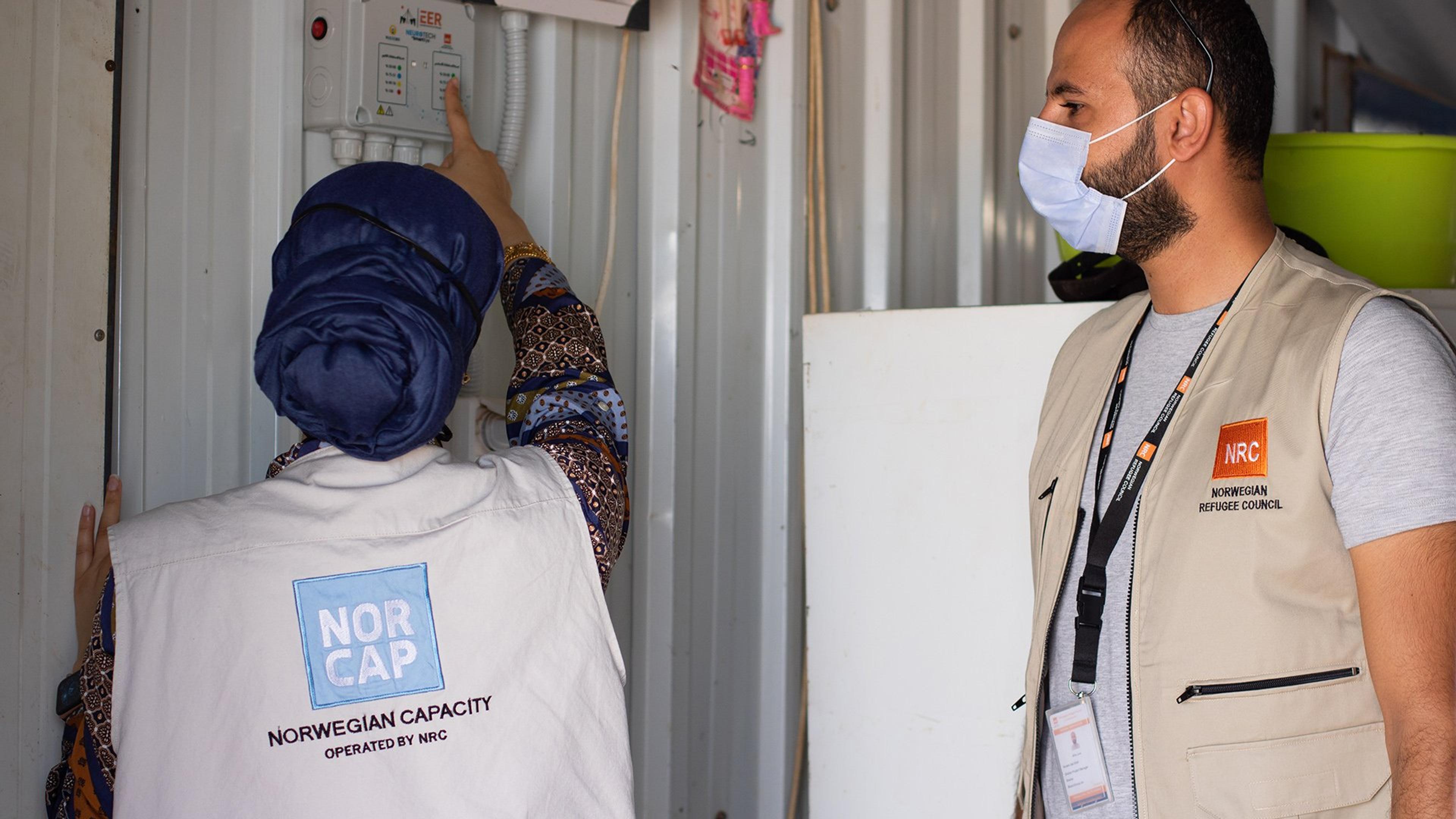Equitable Electricity for Refugees in Jordan
 © NRC
© NRCScope of the project
Energy is rationed in camps in Jordan, limiting the number of hours in the day when the refugees have access to energy. To address this challenge, NRC and Neurotech developed an energy controller system installed at a shelter level that controls electricity consumption of households based on primary and secondary electricity needs. The aim was to increase the number of hours of electricity provision at the shelter level while minimising electricity cuts to devices relating to primary needs, such as lighting, storage of medications, and food cooling/storage. Subsequently, camp residents would have increased electricity access and contribute to efficient electricity usage.
Impact and lessons learned
Overall, three versions of the energy controller were developed. In total of 190 controllers were installed in Village 2 in Azraq camp, benefiting a total of around 850 individuals, 50% of them being females.
NRC completed an outcome monitoring exercise in June 2022. The key findings included that households used to receive an average of 11.5 hours of electricity prior to the installation of the device across all family sizes. When the device was installed, 86% of respondents reported an increase in receiving electricity by an average of 9.6 hours so that the average family was receiving 21.1 hours of electricity per day. It is worth noting that families who have 7-9 and 11 members reported a higher duration of electricity than the average. Of families who reported having at least one member with a disability, 85% reported an increase in the duration of having electricity when compared to the average.
In addition, 94% of the respondents found that the device was easy to understand in terms of the lights/sound indicator. 96% of occupants reported satisfaction with the quality and outputs of the project, which was calculated by taking the weighted average of satisfaction of the electricity availability hours after the installation of the controller, satisfaction with the electrical distribution of the primary and secondary lines, the usefulness of device's alarm, and ease in understanding device's colours and sounds.
Other benefits of the device included:
- Reduced food spoilage: as one of the main concerns when it comes to electricity supply, 69.8% of households, who had reported that food used to get spoiled prior to the installation of the device, reported that food was not being spoiled anymore after the installation of the device.
- Safety of shelter: all participants reporting feeling safe in their shelters after the device had been installed.
- Effects on day-to-day activities: when asked if the change in supply had affected their daily activities, 63% of respondents reported that it did through either one or more of the following:
- Having electricity at night.
- Being able to use electrical devices such as fans, lights, chargers, and TV, especially at night.
- Children studying at night.
- Ability to finish household chores.
- Connecting the refrigerator
- Finally, an unforeseen outcome of the EER project was that participants reduced energy consumption and were only using electricity when needed: the monitoring showed considerable savings in electricity consumption in around 50% of the 190 T-shelters where the smart controllers were installed.
As this was the first innovation project taken on by NRC Jordan several lessons have been learnt that can be applied to similar, future projects. Key learnings include:
Engagement with project participants and other relevant stakeholders from the beginning of the project is important as it provides buy-in from them and allows smooth implementation of the project. The project was implemented in a participatory manner, whereby camp residents were consulted and informed of the objectives of the project. This provided the buy-in from the beneficiaries as well as the needed knowledge on beneficiaries’ electrical consumption needs.
Engagement of the implementation team at the project planning phase can help in minimizing changes in the later stage of the project. NRC’s programming team is based in three distinct locations: Azraq camp, Za’atari camp and host communities – therefore, until the project site was selected, it was not known which team would work on the project. Once the site was chosen, the implementation team's late involvement led to gaps and cost discrepancies in the initial plan, which, though eventually resolved, could have been prevented by engaging them from the start of the project.
Data driven decision and adaptative implementation processes are key to implementing innovation projects. While the implementation team faced several delays for various reasons, the team quickly adapted, took data driven decisions to correct and achieve the project milestones.
Development of clear roles and responsibilities and recognizing the risks anticipated in the project helps in maintaining healthy relationship with partners. While NRC and Neurotech worked together to develop a functional device, internal communication and transparency across different teams and partners could have been better. The team worked on existing responsibility and risk matrices to refine them further which ensured smooth implementation.
Ensuring NRC's expectations are aligned with the private sector partners’ approach is crucial, particularly in an agile innovation project. A key learning for NRC from this project is working with private sector partners. There were several aspects which was not foreseen by the project management team initially and it took some time for partners and NRC to align their expectations from the project.
The way forward
The learnings from the EER project has fed into a new project led by UNHCR that will facilitate increased energy access for refugees in the camp. UNHCR and Jordanian electricity distribution companies are now in discussions to supply 24-hour electricity to the camps with the installation of shelter-level meters just as found in homes in host communities. The plan, to be rolled out in 2025, is to provide free electricity up to a certain number of kilowatts and then allow households the option to purchase a pre-paid top-up.
Project partners
This project was lead by NRC Jordan who partnered with the Jordanian startup Neurotech.